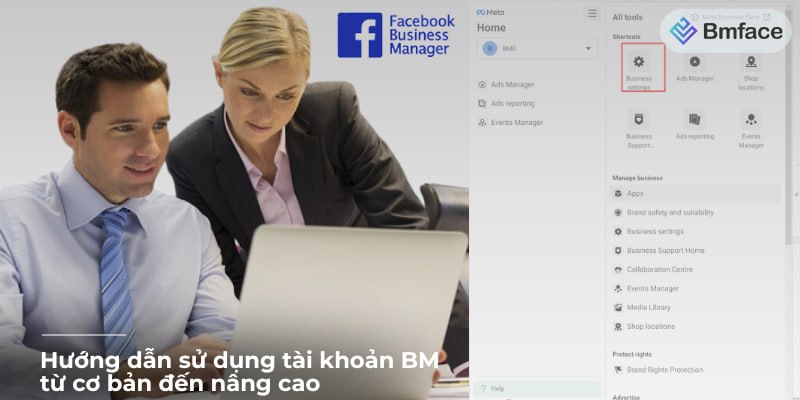In today's fast-paced business environment, effective collaboration and streamlined workflows are critical to success. With the integration of various collaboration tools in Facebook Business Manager, businesses can significantly improve the efficiency of their workflows. Join BMface to explore how seamless integration can enhance collaboration and increase productivity across teams.
Centralized Communication Channels:

Integrating collaboration tools with Business Manager offers the key benefit of centralizing communication channels. By consolidating communication within a single platform, teams can communicate more effectively, share updates, and collaborate on projects in real-time. Whether it's through instant messaging, video calls, or group discussions, teams can stay connected and informed, leading to faster decision-making and improved coordination.
One of the primary advantages of centralizing communication channels within Business Manager is the ability to streamline communication workflows. Instead of juggling multiple communication tools and platforms, teams can access all communication channels—from instant messaging to video conferencing—within a unified interface. This eliminates the need to switch between different apps or tabs, saving time and reducing distractions for team members.
Moreover, centralizing communication within Business Manager fosters transparency and visibility across the organization. By providing a centralized platform for communication, teams can easily access past conversations, shared documents, and project updates, ensuring that everyone has access to the information they need to collaborate effectively. This transparency promotes accountability and alignment, as team members can track progress and stay informed about project developments in real-time.
Additionally, centralizing communication within Business Manager facilitates seamless collaboration among remote or distributed teams. With features such as instant messaging, video conferencing, and file sharing, teams can collaborate on projects regardless of geographic location or time zone. This enables teams to work together more efficiently, overcome communication barriers, and achieve better results, regardless of physical distance.
Furthermore, Business Manager offers robust security and access controls to ensure that communication remains secure and confidential. With features such as user authentication, encryption, and permission settings, businesses can control access to sensitive information and ensure that only authorized users have access to confidential communication channels. This safeguards sensitive data and protects against unauthorized access or data breaches.
Centralizing communication channels within Business Manager offers numerous benefits for teams seeking to enhance collaboration and productivity. By providing a unified platform for communication, fostering transparency and visibility, enabling seamless collaboration among remote teams, and ensuring security and compliance, Business Manager empowers teams to communicate more effectively and achieve better results.
Enhanced Project Management:

Integrated collaboration tools within Business Manager offer robust project management capabilities, empowering teams to plan, organize, and track project progress more efficiently. With features such as task assignment, deadline tracking, and progress monitoring, teams can ensure that projects stay on track and are completed in a timely manner. Additionally, integrated calendars and scheduling tools help teams coordinate meetings and deadlines more effectively, reducing the risk of missed deadlines and misunderstandings.
One of the primary benefits of leveraging integrated collaboration tools for project management is the ability to centralize project-related information and workflows. Instead of using separate tools or platforms for task management, document sharing, and communication, teams can access all project-related information within a unified interface. This streamlines project coordination and ensures that all team members have access to the latest updates and resources.
Moreover, integrated collaboration tools offer robust task management capabilities, allowing teams to assign tasks, set deadlines, and track progress in real-time. By assigning tasks to specific team members and setting deadlines, teams can ensure accountability and transparency throughout the project lifecycle. Additionally, progress tracking features enable teams to monitor task completion and identify potential bottlenecks or delays, allowing for timely intervention to keep projects on schedule.
Additionally, integrated calendars and scheduling tools enable teams to coordinate meetings, milestones, and deadlines more effectively. By centralizing scheduling within Business Manager, teams can easily view upcoming events, set reminders, and coordinate availability across team members. This reduces the risk of scheduling conflicts and ensures that all stakeholders are aligned on project timelines and milestones.
Furthermore, integrated collaboration tools within Business Manager offer advanced reporting and analytics capabilities, enabling teams to gain insights into project performance and identify areas for improvement. By analyzing key metrics such as task completion rates, project timelines, and resource allocation, teams can optimize their project management processes and drive better results over time.
Integrated collaboration tools within Business Manager provide teams with powerful project management capabilities, enabling them to plan, organize, and track projects more efficiently. By centralizing project-related information and workflows, streamlining task management, coordinating meetings and deadlines, and leveraging reporting and analytics, teams can optimize their project management processes and achieve better results.
Seamless File Sharing and Document Collaboration

Business Manager integration facilitates seamless file sharing and document collaboration, eliminating the need for multiple platforms and reducing the risk of version control issues. Teams can securely share files, documents, and presentations within the platform, collaborate in real-time, and track changes effortlessly. This streamlines the review and approval process, enhances collaboration among team members, and ensures that everyone is working with the most up-to-date information.
One of the primary benefits of leveraging Business Manager for file sharing and document collaboration is the centralization of files and documents within a single platform. Instead of using separate tools or platforms for file storage and sharing, teams can access all relevant documents and files directly within Business Manager. This eliminates the need to switch between different applications, streamlining the collaboration process and reducing the risk of information silos.
Moreover, Business Manager offers robust security features to ensure the confidentiality and integrity of shared files and documents. With features such as access controls, encryption, and audit trails, businesses can control who has access to shared files and track changes made to documents over time. This safeguards sensitive information and mitigates the risk of unauthorized access or data breaches.
Additionally, Business Manager enables real-time collaboration on documents, allowing multiple team members to work on the same file simultaneously. With features such as co-authoring and commenting, teams can collaborate on documents in real-time, provide feedback, and track changes made by each team member. This promotes collaboration and enhances productivity, as team members can work together more effectively to create and refine documents.
Furthermore, Business Manager offers version control features to help teams manage changes to documents and track revisions over time. By maintaining a history of document versions and changes, teams can revert to previous versions if needed and ensure that everyone is working with the most up-to-date information. This reduces the risk of confusion or errors caused by outdated documents and ensures that all team members are aligned on the latest changes.
Business Manager integration offers seamless file sharing and document collaboration capabilities, enabling teams to work together more effectively and efficiently. By centralizing files and documents within the platform, providing robust security features, enabling real-time collaboration, and offering version control functionality, Business Manager empowers teams to streamline the collaboration process, enhance productivity, and drive better results.
Improved Access Control and Security
Integrated collaboration tools within Business Manager offer robust access control and security features, ensuring that sensitive information remains protected. With granular permission settings, teams can control who has access to specific documents and information, reducing the risk of data breaches and unauthorized access. Additionally, built-in security measures such as encryption and multi-factor authentication help safeguard sensitive data and ensure compliance with privacy regulations.
One of the primary benefits of leveraging integrated collaboration tools for access control and security is the ability to set granular permission settings. Within Business Manager, teams can define roles and permissions for each team member, specifying who can view, edit, or share specific documents and information. This ensures that sensitive information remains accessible only to authorized personnel, reducing the risk of data leaks or unauthorized access.
Moreover, Business Manager offers built-in security measures to safeguard sensitive data and protect against external threats. Features such as encryption and secure data transmission protocols help ensure that data remains protected during transit and storage. Additionally, multi-factor authentication adds an extra layer of security by requiring users to provide multiple forms of verification before accessing sensitive information, reducing the risk of unauthorized access.
Additionally, Business Manager provides audit trail functionality to track user activity and changes made to documents over time. By maintaining a record of user actions and document revisions, teams can monitor access to sensitive information and detect any unauthorized or suspicious activity. This enables teams to identify security threats and take corrective action to mitigate risks before they escalate.
Furthermore, Business Manager enables teams to comply with privacy regulations and industry standards by providing tools and features to ensure data security and privacy. With features such as data encryption, compliance certifications, and privacy controls, businesses can demonstrate their commitment to protecting customer data and maintaining compliance with regulatory requirements.
Integrated collaboration tools within Business Manager offer robust access control and security features, enabling teams to protect sensitive information and ensure compliance with privacy regulations. By providing granular permission settings, built-in security measures, audit trail functionality, and compliance tools, Business Manager empowers teams to collaborate securely and confidently, reducing the risk of data breaches and safeguarding sensitive information.
Data-Driven Insights and Analytics
Business Manager integration provides valuable data and analytics insights into collaboration efforts, enabling teams to track performance metrics, identify bottlenecks, and optimize workflows. By analyzing key metrics such as communication frequency, task completion rates, and project timelines, teams can identify areas for improvement and implement strategies to enhance productivity and efficiency.
One of the primary benefits of leveraging Business Manager for data-driven insights and analytics is the ability to track and measure collaboration performance metrics. By accessing data on communication frequency, task completion rates, and project timelines within the platform, teams can gain visibility into how effectively they are collaborating and where improvements can be made. This data-driven approach enables teams to identify bottlenecks, address inefficiencies, and optimize workflows to achieve better results.
Moreover, Business Manager offers advanced reporting and analytics capabilities to help teams make sense of collaboration data and derive actionable insights. With customizable dashboards, interactive reports, and visualization tools, teams can visualize collaboration metrics and trends, identify patterns, and uncover opportunities for improvement. This enables teams to make informed decisions and prioritize initiatives that will have the greatest impact on productivity and efficiency.
Additionally, Business Manager enables teams to track key performance indicators (KPIs) related to collaboration efforts, such as response times, resolution rates, and project completion rates. By monitoring these KPIs over time, teams can assess the effectiveness of their collaboration strategies, identify areas for improvement, and benchmark performance against organizational goals. This data-driven approach empowers teams to continuously refine their collaboration processes and drive better outcomes.
Furthermore, Business Manager offers predictive analytics capabilities to help teams anticipate future collaboration trends and proactively address potential challenges. By analyzing historical collaboration data and trends, teams can identify patterns and forecast future demand for resources, enabling them to allocate resources more effectively and optimize their workflows to meet evolving business needs.
Conclusion:
integrating collaboration tools within Facebook Business Manager offers businesses a powerful solution for improving collaboration and workflow efficiency. By providing access to valuable data and analytics insights, enabling teams to track performance metrics, and facilitating data-driven decision-making, Business Manager empowers teams to streamline collaboration efforts, boost productivity, and achieve better outcomes.
For more insights and updates on effective social media strategies, make sure to follow Bmface and our tutorial blog, where we share the latest and most effective content marketing tips.
Cảm ơn bạn đã theo dõi bài viết. Mua hàng tại Bmface.com để ủng hộ đội ngũ Admin viết thêm nhiều bài viết hay. Xin cảm ơn!
































